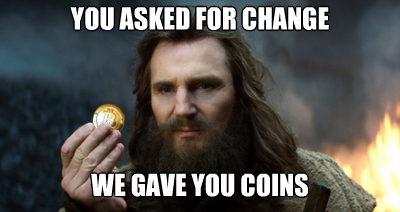
Hello everyone! Long time, no steem.
Speaking of cheesy, suppose my neighbor's a dairy farmer and I want a block of his finest cheddar cheese. So I propose to him that I can give him something of mine in return for a block of cheese. There's a roadblock here: how do we reach a consensus on the relative values of our products?
Say that I make the best damn fidget spinners around and I value a block of cheese at 10 of my fidget spinners. If I was (WAS) a cheese addict, I would be happy to pay 69 fidget spinners. I bring him a box of my FDA-approved high-performance spinners and he says, "What the hell are these? I don't see how these could equate to a block of cheese in any way possible. Give me something else." Then I ask him what he would want instead and he supposes he would trade me a block for a pair of Lightning McQueen Crocs. I don't see how those could equate to a block of cheese in any way possible, so the deal is off.
Individuals naturally have different tastes, preferences, and evaluations of substance. Without introducing a medium that can map the value of a product to a countable and discrete measure of value, relative interests are prone to linear misalignment: in comes the concept of a universal measure, a currency.
Now in a case involving a currency, both the dairy farmer and I can reach a consensus on the worth of his block of cheddar in terms of the currency. The deal could still not happen, but at least now there's a mechanism to facilitate consensus.
A logical followup question could be: "How do we determine that universal amount of worth for these products in the first place?" This can be done a couple of ways: via a valuation of the enthusiasm and trust that the users of a currency have in it, and/or via the valuation of a universally valued product. Either way, the problem being addressed is finding a basis for substance to value and value to substance. In other terms, [commodity -> currency -> commodity -> ...] is a basis for assessing the value of a product.
Let's think now about the cryptocurrency environment. Some coins, like GridCoin, FoldingCoin, Einsteinium, etc., get their value from work performed on tangible scientific research and development and other causes that cast a real-world projection outside of the coin's own presence. Most coins, however, derive their value from more internal and self-serving properties like a focus on transaction anonymity, fast block times, network hashrate, method of network consensus, etc. And yet, nothing prevents these different coins from being exchangeable.
I believe that cryptocurrencies have become such a force in these recent years because of our developing enthusiasm, valuation, and trust in their purpose and delivery. We now are more than ever placing a higher value on not just the cost-derived value of the work required to maintain and perpetuate a given coin network, but also on the ideas and intrinsic functions a given coin operates with respect to. Cryptocurrencies have become a true superposition of commodity and currency, where [commodity <--> currency]. All of these developments have and will continue to come about through greater understanding and experimentation.
What do you all think? Comment below!
https://instagram.com/askshane
